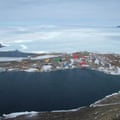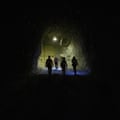In the past year Guardian Australia’s reporting exposed injustice and held the powerful to account, from Antarctica to the Top End.
Reader support doesn’t just make this reporting possible – it also keeps it open for everyone, regardless of their ability to pay. Below are some of the highlights of the high-impact journalism our readers funded in 2023.
We are so grateful for the supporters who invest in us to power this work. If you can, please make a year-end gift to fund our reporting in 2024 and beyond.

Holding big business to account amid the cost-of-living crisis
Through detailed, long-term analysis of financial accounts, Jonathan Barrett was the first to demonstrate how Australia’s dominant supermarkets have consistently expanded profit margins during the pandemic and inflationary period, pushing grocery prices beyond the levels needed to cover rising costs, and piling pressure on stretched households. The reporting has been repeatedly cited in parliamentary committees examining inflation and the rising cost of living.

Revealing secret cuts to climate research
Henry Belot’s series of exclusive reports, based on leaked documents and briefings from a dozen scientists, triggered a Senate inquiry and revealed the true extent of cuts to crucial climate change research in Antarctica. In doing so it cast doubt on whether Australia was truly fulfilling its stewardship claims and obligations.

Fighting for justice for survivors of abuse
Acting on a tipoff, and using sources developed over years of reporting on courts and the justice system, Christopher Knaus established how the Catholic church and other powerful institutions were seeking to permanently halt survivors’ cases in almost every instance when an alleged perpetrator had died. The stories led to the New South Wales and commonwealth attorneys general instructing their departments to monitor the church’s behaviour. In November the church lost a landmark high court case, which established that permanent stays should only be granted in “exceptional” cases.

Exposing a Top End ‘carbon bomb’
Lisa Cox’s series of exclusives about the expansion of Northern Territory gas developments ignited a national debate about the extent and scale of fossil fuel expansion in the region and helped to trigger a parliamentary inquiry. The months-long investigation revealed the links between onshore and offshore gas projects and the $1.5bn taxpayer-funded Middle Arm hub project in Darwin, and highlighted the impact of fossil fuel expansion on First Nations communities. It presented hard evidence that the Albanese government knew its funding of the project would directly enable fossil fuel expansion, prompting a public backlash and calls from independent and crossbench MPs for the withdrawal of government subsidies.

Continuing to interrogate the robodebt scandal
Luke Henriques-Gomes’ and Christopher Knaus’s explosive reporting on the robodebt program was instrumental in making the case for a royal commission. When that royal commission began hearings in October 2022 Henriques-Gomes and the wider reporting team covered it rigorously, attending each of the 46 days of hearings and publishing more than 60 stories. Guardian Australia reporting was repeatedly referenced during the hearings, and the commissioner, Catherine Holmes, would go on to praise the Guardian’s coverage. In her July report Holmes characterised robodebt as a “crude and cruel” scheme and a massive failure of public administration. The government’s central public service agency has since said it will investigate 16 referrals relating to former and current bureaucrats named in the report.

Unearthing the truth about secret burials
Lorena Allam’s and Sarah Collard’s year-long investigation explored possible clandestine burials and unmarked graves at stolen generations-era institutions. It revealed that a ground-penetrating radar survey of Kinchela boys’ home in northern NSW had identified at least nine “anomalies” that may be consistent with “historical clandestine burials”. It also revealed that as many as 400 Aboriginal children and babies are likely to have been buried in unmarked graves at three Western Australian missions. Responding to public pressure in the aftermath of the revelations, the NSW premier, Chris Minns, vowed to take action if potential burial sites at other institutions were uncovered.

Inside the defamation trial of the century
Ben Doherty spent more than 110 days in court, over two years, covering every element of the defamation case brought by Ben Roberts-Smith against the publishers he accused of defamation over allegations of war crimes. In total Doherty filed more than 180 stories on the trial and on broader allegations levelled against Australian special forces soldiers in Afghanistan. He also hosted a seven-part narrative podcast series, Ben Roberts-Smith v the media, which took listeners inside the trial. When the highly anticipated judgment was handed down in June, Doherty’s knowledge of the trial’s intricacies enabled him to incisively report the most significant findings and to analyse with clarity the decision and its ramifications.

Reporting the voice referendum with rigour and balance
Led by our Indigenous affairs editor, Lorena Allam, Guardian Australia devoted significant time and resources to covering the voice referendum campaign. Josh Butler led coverage of the political debate, writing several exclusive reports on campaign groups and their tactics, including revelations about the complex web of conservative groups and interests contributing to the no campaign.Allam and Sarah Collard helped elevate the often-unheard grassroots views and voices of Aboriginal people, from remote Arnhem Land to suburban Sydney. A series of factchecks, including thorough breakdowns of the yes and no pamphlets, helped cut through spin and misinformation, while the Full Story podcast hosted a special series answering listeners’ frequently asked questions via a panel comprising elders, academics and constitutional experts.

Holding power to account outside the big cities
Fleur Connick’s coverage of the impact of dust pollution from the Cadia goldmine in NSW has kept pressure on environmental regulators and the mining giant Newcrest, and empowered locals who felt stifled by a “cone of silence”. Working out of Deniliquin in the NSW Riverina region as part of the Guardian’s Rural Network initiative, Connick built relationships with locals and scrutinised Newcrest’s dust production and dispersal methods, exclusively revealing how lead from the mine had been linked to lead found in residents’ rainwater tanks.

In-depth coverage of the Fifa Women’s World Cup
Long a leader in coverage of women’s sport, the Guardian’s approach to the 2023 Women’s World Cup was comprehensive – from an interactive guide to all 736 players to features, analysis, news reporting, expert blogs and match-day packages. The Matildas’ success on the pitch captured the nation’s imagination, culminating in a semi-final against England in Sydney. The Guardian sent six reporters and one editor to Stadium Australia – the biggest contingent of any of the major news outlets.

Drawing much-needed attention to Indigenous road deaths
Nino Bucci’s investigation into the safety of Aboriginal pedestrians in the Northern Territory prompted the federal government to push ahead with a strategy to address the issue. After the death of Kumanjayi Dixon, Bucci exclusively obtained four decades of statistics from the territory’s transport department. Over six months he worked with families and lawyers to gather information on road deaths that had never been reported publicly. The resulting investigation highlighted in stark detail the extent of the problem and the lives impacted: the enormous overrepresentation of Aboriginal people in road deaths, the low level of prosecution and the lack of any plan to improve safety.

Investigating systemic problems in youth justice
Ben Smee’s award-winning investigative series provided a new, rarely heard perspective on the complex issue of youth justice in Queensland. Prompted by reports of extensive solitary confinement in the Cleveland youth detention centre, Smee worked with whistleblowers to unravel systemic problems in youth justice, including widespread detention lockdowns, a lack of schooling and rehabilitation, and overbearing, intimidatory policing. The reporting was recognised with the Clarion award for social issues reporting.
A word from our supporters in 2023
“I have noticed the demise of independent, non-politically-motivated journalism in Australia and its effect on our society. I realise now that it’s up to me to support proper journalism in this country, or nothing will change.”
– Aaron
“I support you every year, in my small way, but the banner about the absence of a gambling ads was enough to make me want to acknowledge and applaud your stance. Thanks for saying no to gambling.”
– Diana
“I read and rely on the Guardian’s updates to keep me informed of news and development in the world, and about local Australian politics. I am on a pension in social housing, but I feel guilty receiving such quality, thorough journalism without at least acknowledging it. Thank you.”
– Gary
“I like to support trusted journalism without all the hype and spin.”
– Sharon
“I think the Guardian holds governments, and other ‘protected’ institutions to account, better than any other journalism … I can afford it, and I’m a little embarrassed that it has taken me so long to get on board.”
– Chris
“From my experience with news/media, I believe you are close to, if not the, best at providing true, fair, reasonable, uncompromising, brave, relentless and well-researched news in the world.”
– Thomas
“I feel that the Guardian gives fearless and accurate information in its news reporting. I feel I can trust what I read and gain a complete view and understanding of events as they take place.”
– Judith
“Even though I’ve been unemployed for the last three months, have no source of income and have drained my super to fund my living expenses as I search for work, I cannot let Katharine Murphy’s article in Guardian Australia today go unsupported. When I’ve found work, I will increase my support for you.”
– Eddie
"like this" - Google News
November 27, 2023 at 10:41PM
https://ift.tt/q7Ohcf2
Help fund independent journalism like this in 2024 - The Guardian
"like this" - Google News
https://ift.tt/qXQkUJH
Shoes Man Tutorial
Pos News Update
Meme Update
Korean Entertainment News
Japan News Update
No comments:
Post a Comment